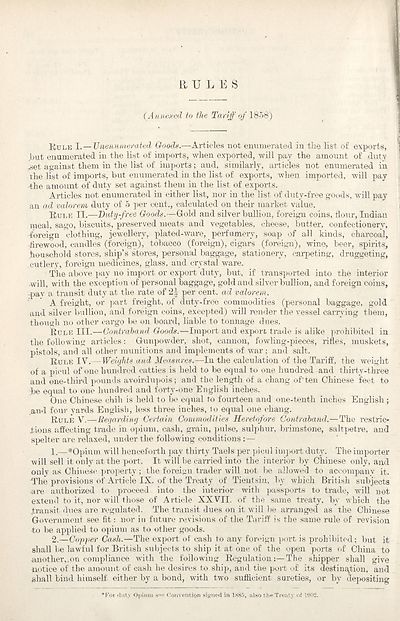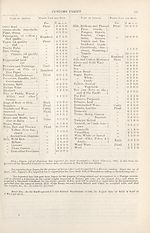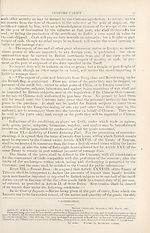1918
(122) Page 54
Download files
Complete book:
Individual page:
Thumbnail gallery: Grid view | List view

R U L E S
( Annexed to the Tariff of 1858)
Eule I.—Unenumerated Goods.—Articles not enumerated in the list of exports,
.but enumerated in the list of imports, when exported, will pay the amount of duty
^et against them in the list of imports; and, similarly, articles not enumerated in
the list of imports, but enumerated in the list of exports, when imported, will pay
>he amount of duty set against them in the list of exports.
Articles not enumerated in either list, nor in the list of duty-free goods, will pay
an ad valorem duty of 5 per cent., calculated on their market value.
Eule II.—Duty-free Goods.—Gold and silver bullion, foreign coins, flour, Indian
meal, sago, biscuits, preserved meats and vegetables, cheese, butter, confectionery,
foreign clothing, jewellery, plated-ware, perfumery, soap of all kinds, charcoal,
firewood, candles (foreign), tobacco (foreign), cigars (foreign), wine, beer, spirits,
household stores, ship’s s'tores, personal baggage, stationery, carpeting, druggeting,
cutlery, foreign medicines, glass, and crystal ware.
The above pay no import or export duty, but, if transported into the interior
•will, with the exception of personal baggage, gold and silver bullion, and foreign coins,
pay a transit duty at the rate of 2 | per cent, ad valorem.
A freight, or part freight, of duty-free commodities (personal baggage, gold
and silver bullion, and foreign coins, excepted) will render the vessel carrying them,
though no other cargo be on board, liable to tonnage dues.
Eule III.—Contraband Good#.—Import and export trade is alike prohibited in
the following articles: Gunpowder, shot, cannon, fowling-pieces, rifles, muskets,
pistols, and all other munitions and implements of war: and salt.
Eule IV. - Weights and Measures.—In the calculation of the Tariff, the weight
of a picul of one hundred catties is held to be equal to one hundred and thirty-three
and one-third pounds avoirdupois; and the length of a chang of'ten Chinese feet to
:be equal to one hundred and forty-one English inches.
One Chinese chih is held to be equal to fourteen and one-tenth inches English;
,and four yards English, less three inches, to equal one chang.
Eule V.—Regarding Certain Commodities Heretofore Contraband.—The restric¬
tions affecting trade in opium, cash, grain, pulse, sulphur, brimstone, saltpetre, and
spelter are relaxed, under the following conditions: —
1. —*Opium will henceforth pay thirty Taels per picul import duty. The importer
will sell it only at the port. It will be carried into the interior by Chinese only, and
only as Chinese property; the foreign trader will not be allowed to accompany it.
The provisions of Article IX. of the Treaty of Tientsin, by which British subjects
are authorized to proceed into the interior with passports to trade, will not
extend to it, nor will those of Article XXVII. of the same treaty, by which the
.transit dues are regulated. The transit dues on it will be arranged as the Chinese
Government see fit: nor in future revisions of the Tariff is the same rule of revision
•to be applied to opium as to other goods.
2. —Copper Cash.—The export of cash to any foreign port is prohibited; but it
shall be lawful for British subjects to ship it at one of the open ports of China to
another,.on compliance with the following EegulationThe shipper shall give
notice of the amount of cash he desires to ship, and the port of its destination, and
shall bind himself either by a bond, with two sufficient sureties, or by depositing
•For duty Opium Convention signed in 1885, also the Treaty of 1902.
( Annexed to the Tariff of 1858)
Eule I.—Unenumerated Goods.—Articles not enumerated in the list of exports,
.but enumerated in the list of imports, when exported, will pay the amount of duty
^et against them in the list of imports; and, similarly, articles not enumerated in
the list of imports, but enumerated in the list of exports, when imported, will pay
>he amount of duty set against them in the list of exports.
Articles not enumerated in either list, nor in the list of duty-free goods, will pay
an ad valorem duty of 5 per cent., calculated on their market value.
Eule II.—Duty-free Goods.—Gold and silver bullion, foreign coins, flour, Indian
meal, sago, biscuits, preserved meats and vegetables, cheese, butter, confectionery,
foreign clothing, jewellery, plated-ware, perfumery, soap of all kinds, charcoal,
firewood, candles (foreign), tobacco (foreign), cigars (foreign), wine, beer, spirits,
household stores, ship’s s'tores, personal baggage, stationery, carpeting, druggeting,
cutlery, foreign medicines, glass, and crystal ware.
The above pay no import or export duty, but, if transported into the interior
•will, with the exception of personal baggage, gold and silver bullion, and foreign coins,
pay a transit duty at the rate of 2 | per cent, ad valorem.
A freight, or part freight, of duty-free commodities (personal baggage, gold
and silver bullion, and foreign coins, excepted) will render the vessel carrying them,
though no other cargo be on board, liable to tonnage dues.
Eule III.—Contraband Good#.—Import and export trade is alike prohibited in
the following articles: Gunpowder, shot, cannon, fowling-pieces, rifles, muskets,
pistols, and all other munitions and implements of war: and salt.
Eule IV. - Weights and Measures.—In the calculation of the Tariff, the weight
of a picul of one hundred catties is held to be equal to one hundred and thirty-three
and one-third pounds avoirdupois; and the length of a chang of'ten Chinese feet to
:be equal to one hundred and forty-one English inches.
One Chinese chih is held to be equal to fourteen and one-tenth inches English;
,and four yards English, less three inches, to equal one chang.
Eule V.—Regarding Certain Commodities Heretofore Contraband.—The restric¬
tions affecting trade in opium, cash, grain, pulse, sulphur, brimstone, saltpetre, and
spelter are relaxed, under the following conditions: —
1. —*Opium will henceforth pay thirty Taels per picul import duty. The importer
will sell it only at the port. It will be carried into the interior by Chinese only, and
only as Chinese property; the foreign trader will not be allowed to accompany it.
The provisions of Article IX. of the Treaty of Tientsin, by which British subjects
are authorized to proceed into the interior with passports to trade, will not
extend to it, nor will those of Article XXVII. of the same treaty, by which the
.transit dues are regulated. The transit dues on it will be arranged as the Chinese
Government see fit: nor in future revisions of the Tariff is the same rule of revision
•to be applied to opium as to other goods.
2. —Copper Cash.—The export of cash to any foreign port is prohibited; but it
shall be lawful for British subjects to ship it at one of the open ports of China to
another,.on compliance with the following EegulationThe shipper shall give
notice of the amount of cash he desires to ship, and the port of its destination, and
shall bind himself either by a bond, with two sufficient sureties, or by depositing
•For duty Opium Convention signed in 1885, also the Treaty of 1902.
Set display mode to:
![]() Universal Viewer |
Universal Viewer | ![]() Mirador |
Large image | Transcription
Mirador |
Large image | Transcription
Images and transcriptions on this page, including medium image downloads, may be used under the Creative Commons Attribution 4.0 International Licence unless otherwise stated. ![]()
| Asian directories and chronicles > 1918 > (122) Page 54 |
|---|
| Permanent URL | https://digital.nls.uk/194894916 |
|---|
| Attribution and copyright: |
|
|---|---|
| Description | Volumes from the Asian 'Directory and Chronicle' series covering 1917-1941, but missing 1919 and 1923. Compiled annually from a multiplicity of local sources and research. They provide listings of each country's active corporations, foreign residents and government agencies of all nationalities for that year, together with their addresses. Content includes: various treaties; coverage of conflicts; currencies and taxes; consular fees; weights and measures; public holidays; festivals and traditions. A source of information for both Western states and communities of foreigners living in Asia. Published by Hongkong Daily Press. |
|---|---|
| Shelfmark | H3.86.1303 |
| Additional NLS resources: |

